Every night at bedtime, my boys lay waiting for me to begin singing the Shema. This nightly ritual began when they were babies. They have trouble falling asleep if we ever skip this moment; it is rare that we do.
They join in trying to out-sing the other. The rule is whoever sings the prayer the most respectfully gets tucked in first with a big hug and requisite nose-beeping routine. My boys are (almost) 12 and 13 years old now. I can’t believe they still want me to sing with them before bed, but I am truly grateful for this daily moment of intention where I feel connected to my children and G-d.
Shira (singing) has always brought me great joy.
Growing up at camp and in youth groups, I spent many evenings singing around a campfire or celebrating Shabbat. Debbie Friedman might as well have been a rockstar to me.
Belting out “not by might, and not by power” while raising my arms to the sky. Dancing like “Miriam and the women danced” locking arms with friends and swinging each other around. These moments feel freeing and spiritual.
The ruach and community that grows through music is pure joy.
Whether it’s my family singing the Hamotzi in harmony or Zum Gali Gali in rounds, 5,000 teens singing Hatikvah at BBYO’s International Convention, or the Shema each night, singing hebrew makes me feel Jewish and joyful.
Where there is shira, there is connection, community and love. And where there is music, I find great joy.
– Rachel Grey Ellis
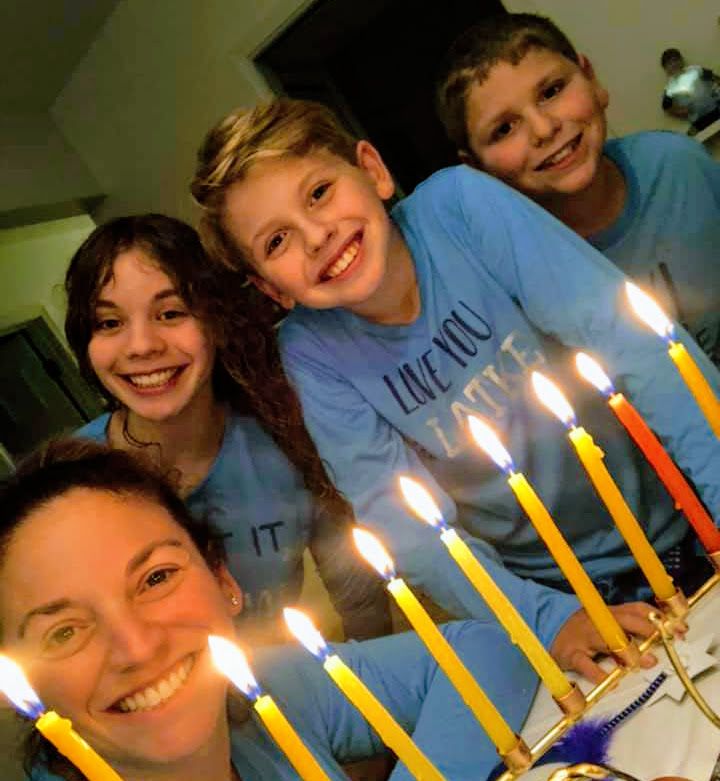
I can’t lie — the idea of Jewish Joy triggers some anxiety for me. There’s an irony in the search for Jewish Joy by someone who by nature, nurture and profession, is something of a pessimist. I generally look for reasons why something isn’t good, won’t work, can’t happen. Needless to say, I’m really fun at parties.
My whole life, I’ve felt like an outsider in the overall Jewish community. Growing up, hockey practice was more important than Hebrew school. So while I may have been very active in BBYO, NEXTGen and The Well, I always felt a little “less than” for lack of knowledge regarding traditions and rituals. It seemed like the togetherness feeling — the joyful feeling — that I wanted to experience was only experienced by others.
However over the past few years, I’ve had the opportunity to reevaluate my relationship with our community. I saw many of my peers, people I’ve known since high school, taking leadership roles in our community. A close friend returning home to serve as a pulpit Rabbi. A fellow AZA regional board member emerging as a state and national leader. Countless contemporaries taking lay leadership roles throughout our community. I saw and I felt … joy.
I swell with pride when I think about the amazing work being done by people I still picture as my high school class- and bunk-mates.
Like when, in Genesis, Jacob had a dream and woke up realizing that G-d was there and he didn’t know/recognize it. Full Disclosure: That reference is a result of reaching out to the aforementioned Rabbi. There is zero chance I’d make that Jewish connection without making the human connection. Which perhaps proves my point — the joy I’ve longed for in Judaism has been there in my community all along. Maybe I’m the Jewish tin man.
For years, I felt like the community I wanted eluded me (oil can). Forever an outsider looking in, watching happy families and friends support, encourage and love each other. And not start to mumble out of the side of their mouth after “melech ha-olam.”
But maybe what I was looking for — a sense of belonging — was there the whole time and I just couldn’t see it. I was unable to recognize that “it” was there all along, like Jacob before he meets the wizard.
Through that lens, I realize all the different ways our community impacts my life. The support and growth I had as a member of BBYO. The fun I’ve had and learning I’ve done through young adult programs. My children’s experiences in preschool at Hillel. Their first summer at Tamarack.
The community I always wanted is pretty clearly the community I currently have. And you were there and you were there and you were there.
I hope that I can allow myself to feel the joy of being part of something now that I recognize how special it is.
– Lowell Weiss

Each night, before bed, my partner Tzvi and I ask each other:
What brings you joy?
We’ve been asking this question for more than three years now. It started after I met with my Rosh Chodesh group during the Hebrew month of Adar and we discussed the joy of the month. I loved the idea of ending our day thinking about what brought us joy.
What brought you joy today?
Some days, it's simple … dinner, sunshine, first snow, seeing the buds on trees, even a good workout. Sometimes it’s bigger things – a professional win, an evening with our shabbat dinner club, planning a trip.
The list is endless. At least it has been so far. Getting our absentee ballots in the mail. Spontaneous tour of a firetruck in our neighborhood. The Peach Truck (slogan: “Delivering Joy”).
When the pandemic hit and we were home together all the time, it became a bit more difficult to find the joy, but we did. Every night, we reflected on our day.
Starting January 1, I decided to start writing down our joyful moments. This wasn’t a New Year’s Resolution, but in the depth of a winter during a pandemic, I thought it would be insightful to see what exactly brought us joy during the darkest times. I started a note on my phone and now my phone reminds me. (Thanks, Apple!)
Some nights, we laugh because we have the same answer. Most recently, our joyful moments have been reconnecting with friends, hugs from nieces and nephews and receiving our vaccines. (Thanks, Science!)
We recently added:
What is your Graditoad? (Thanks, Netflix!)
On Big Mouth, the Gratitoad is grateful – grateful that his skin looks like a rock so his predators can't see him … and grateful to his predators for making him want to jump higher.
What are we grateful for? Often gratitude is for one another. For cooking dinner, for taking a walk or even taking out the trash.
What began three years ago as a cute way to have a conversation at the end of the day – often when we hadn’t seen each other – has turned into a meaningful moment. Our ritual has kept us grounded in the midst of uncertainty.
Some days you think are so horrible, there can’t be any joy, but we find it every night. We push each other to spot and savor these little moments of joy in our days.
- Audrey Bloomberg
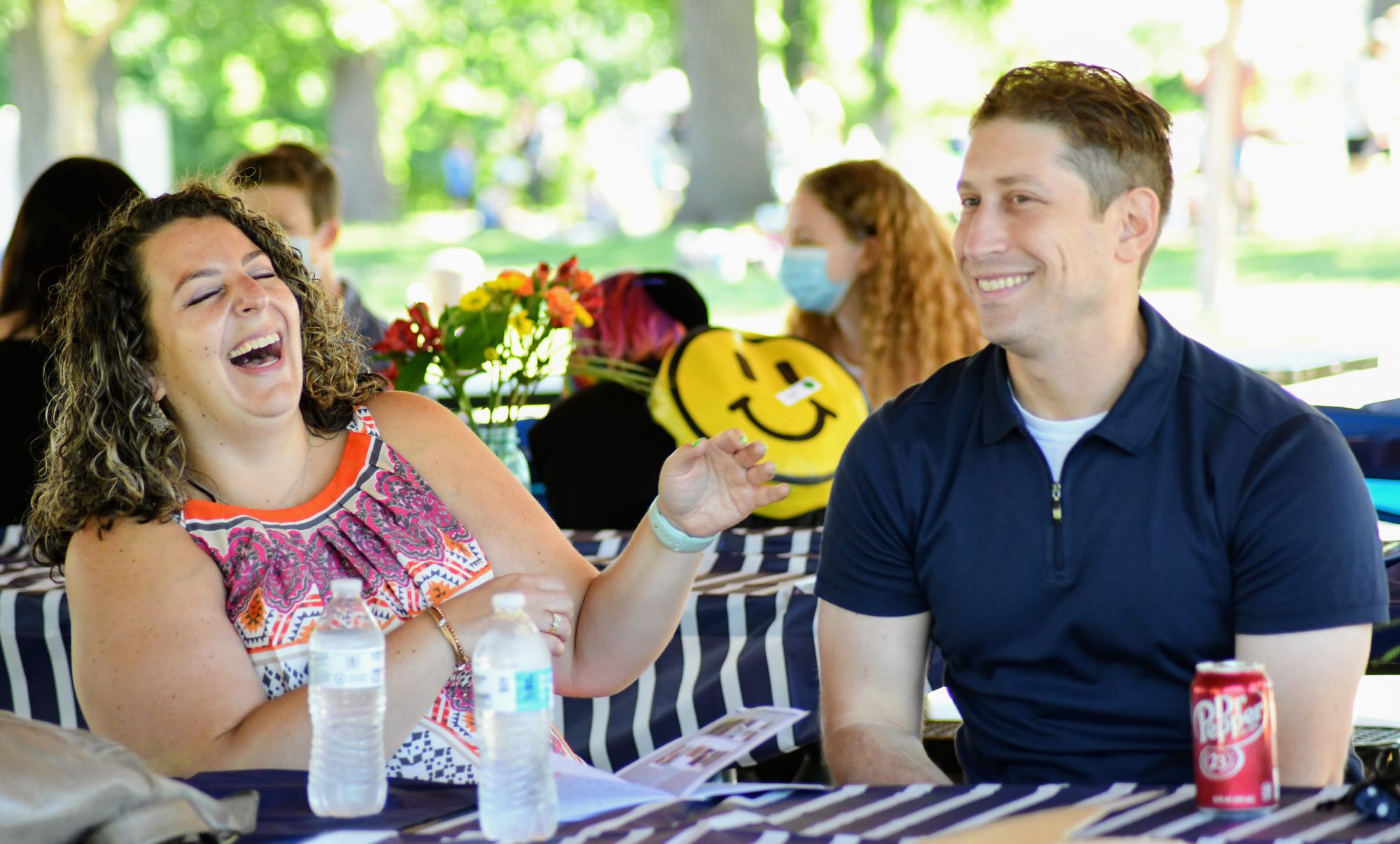
I was pregnant with my first child when my mother was diagnosed with breast cancer for the second time, an unbearable nightmare just a year after treatment for the last round ended. Her hair had grown back, she had emerged from a year of isolation, her immune system recovered from being shocked into submission as the chemotherapy and radiation coursed through her body, and now, we were back in this dark place of fear and surgeries and treatment plans.
The last few months were the hardest. I couldn’t get on a plane, and neither could she. I marveled at the changes in my body, and dreaded the changes to hers, terrified and elated, anxious and worried, spiraling into the unknown.
My mother and my son are soulmates. From the minute he was born, with her by my side, they have shared a deep spiritual connection. Even in the midst of her own trauma, she’d carry him through the house for hours, singing as I slept. She is his best friend, his trusted confidant, his partner in crime, and they love each other with a divine love so pure it sometimes hurts.
Seeing them together now, seven years later — walking hand in hand, playing canasta, lighting the candles, sharing a meal — is more than simply joyful. It is the continuation of a chain of tradition in which we give ourselves completely to the people in our lives. It is gratitude for our family, our people, our community that grounds us and supports us and cares for us in our time of need. It is Judaism in a nutshell, an overwhelming sense of being part of something greater than ourselves, passing that truth from generation to generation.
I try to stay present, and to hold this joy, this gratitude, this depth, this knowledge close to my heart. And so, each time these two see each other, traveling across the country to hold each other in their arms, I offer a blessing.
Blessed are You, God, Source of the universe, for giving us life,
for sustaining us, and for enabling us to reach this day of joy.
- Rabbi Jen Lader
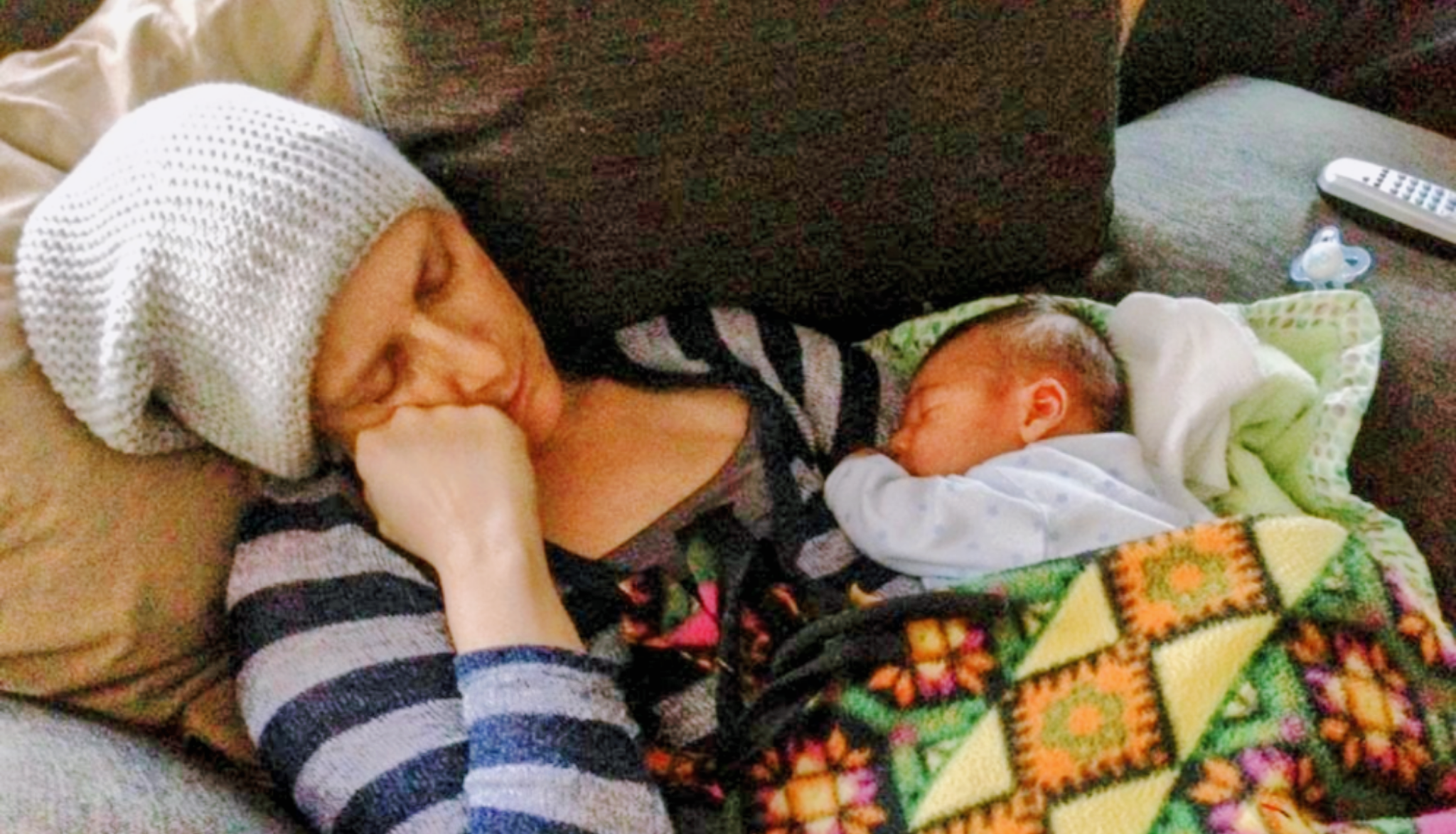
As a secular Jew raised in the cultural Judaism of Workmen’s Circle, Jewish ritual did not play a large role in my life. This was summarized perfectly at my wedding when our Rabbi said, “So let me guess, you want it short and with as little religion as possible.” But even then, the joy of ritual began to creep into my life as my non-Jewish husband and I signed our ketubah with our immediate family looking on — the perfect start for our Jewish family.
While we chose a Jewish daycare for our kids, we picked it because it was a loving community close to home. Religion and ritual were not integral to the equation. But then, each Friday, my oldest son began to insist on wearing a button-down shirt (which he affectionately calls a “work butt”) to school in honor of Shabbat.
Then March 2020 happened. Cancelled plans, cancelled Passover, cancelled art show, cancelled everything. In those dark days of isolation, we all longed for something to look forward to. But what? And how? That’s when the importance of Jewish rituals became clear.
First, we started a Shabbat Zoom, 5:00 Friday nights. Family from across the country would fill my computer screen with smiling faces. We joined together and lit the shabbat candles, my three-year-old son and my 69-year-old cousin leading the prayer together. The smiles were like hugs through the screen. It was the first time that true joy overpowered the fear. The traditions of the Jewish week gave us a momentary, necessary pause from the outside world.
Then I completed the transition into both Jewish Mom and Pandemic Parent when I baked my first challah. The first attempt was a nightmare never to be spoken of again.
Each attempt got a little better. I reached out to friends and cousins for challah tips. I texted pictures to show the rise, the dough ball, the braids. My kids and husband gladly taste tested each batch.
One year and countless batches of challah later, I have the recipe memorized and a full list of tips from my notes app to share.
Now, every morning my 2-year-old looks up at the bread cabinet and says, “Challah! Challah! Challah ... please,” until I oblige. I try to explain to him that not every kid gets fresh baked challah every week, but he just looks at me and says, “More ... please.”
It took a pandemic (a plague!) to teach me that being Jewish is my happy place. I don’t see weekly Friday night services in my future, but I never saw ritual challah baking either. Now, I have learned to be thankful for the peace and routine of the Jewish week. Being Jewish brought me joy and connection and purpose when I needed it most.
- Ariana Carps
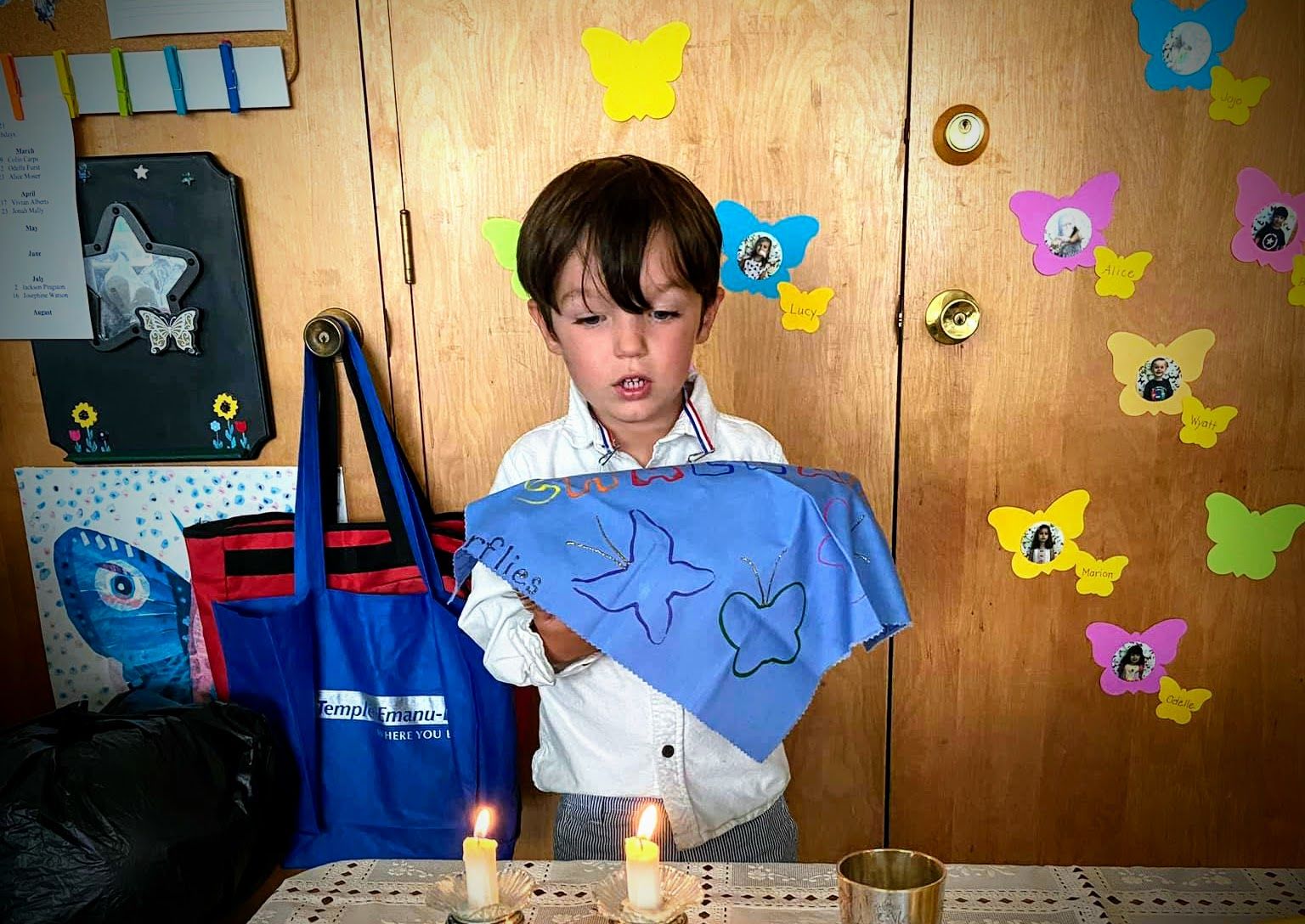
Part of the rhythm of the Jewish holidays for me is Gefilte Fish Making Day.
Each year, my father will complain about the smell (long before there is any smell to complain about), my mother will dig up the yahrzeit candles to cover up the smell, and my mother, my sister and I will gather (often times with my mother’s best friend Lori) to make the fish.
Years ago, the fish was the purview of my mother and my Bubbie. The process had a language all to itself. Mainly, the fish had to be ... puchie. I have never determined if this word is actually yiddish or just a jibberish word somewhere from my family’s history – but it refers to the consistency that the raw gefilte fish is supposed to be. It describes an airiness of the batter, something you can almost hear as the batter is being mixed.
Years ago, when my Bubbie was in her 80s, my mother realized that there might be a day when Bubbie was not there to make the fish. So my mother and Lori demanded that Bubbie not put anything in the bowl until it was measured. I was away at school that year, but I laugh imagining them trying to forcibly restrain her from adding a dash of salt or a pinch of pepper until they could determine the mass of the dash or pinch.
This process resulted in a written-down recipe on a notecard, now stained with fish, among other things. My Bubbie passed in 2003, but now each holiday when we gather together, my sister and I taste the raw fish and declare whether it needs more salt, or pepper – or puchiness. This year, my 10-year-old daughter took part, wetting her hands and rolling the balls to be dropped in the fish stock.
Watching my daughter, my heart filled with joy with each plop of a gefilte fish ball into Bubbie’s stockpot.
- Alicia Chandler
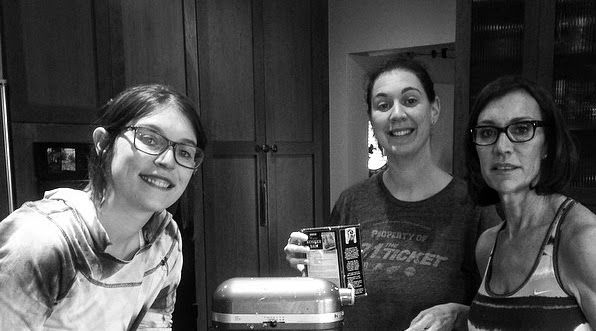
Joy. Unfortunately I don’t think it’s the first thing people think of when they hear the word Judaism.
We Jews tend to emphasize the serious or even the sorrowful, because those moments, those rituals, radiate a power that is palpable. And that’s fair. Those moments deserve attention, and are worthy of the respect and awe that they conjure up. But joy…
Sometimes I think we associate joy with frivolity. That in the absence of tears or deep introspection, the ritual, the words, the practice is somehow… less.
To which I say:
Shtuyot.
I love Judaism, and I am in love with Judaism, because of the joy. And while I could fill pages about how that joy touches me each and every day, I’ll temper my enthusiasm a bit, at least here at the beginning of this beautiful project, because, as the cliche goes, this isn’t a sprint; it’s a marathon. (A joy marathon? Could there be anything better!)
So let me start with a small joy, and let me also qualify that statement by saying that there really is no such thing as “small” joy, because even something that is a frequent occurrence, even part of our everyday routine, can still fill our hearts in magical ways.
My joy today is the whisper bracha, the soft but still audible words of blessings and thanks I say over practically anything and everything — having a cup of coffee, eating a piece of fruit, seeing trees in blossom, even seeing a beautiful person. Judaism asks me to take a breath, detach from the rhythm of habit, and say, Wow!
And I’m filled with joy to oblige her. Because it’s not just the mindfulness or the psychology of that recognition of gratitude that’s joyful. It’s the permission to whisper even if nobody is around, to let words of thanks tickle my lips all throughout the day. To laugh at myself when I forget the bracha, or mess it up in some way.
Because I really don’t think G-d cares if I get the words right. I think G-d cares more about the tickle. I think G-d cares more about the smile, the breath that allows me to step out of the flow of the day and just be.
I think G-d cares about the joy.
– Rabbi Yoni Dahlen
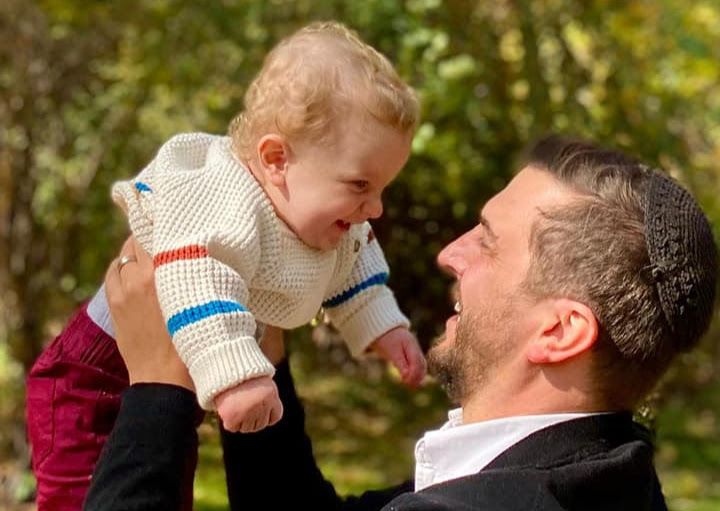
Comments
Sign in or become a Nu?Detroit member to join the conversation.
Just enter your email below to get a log in link.